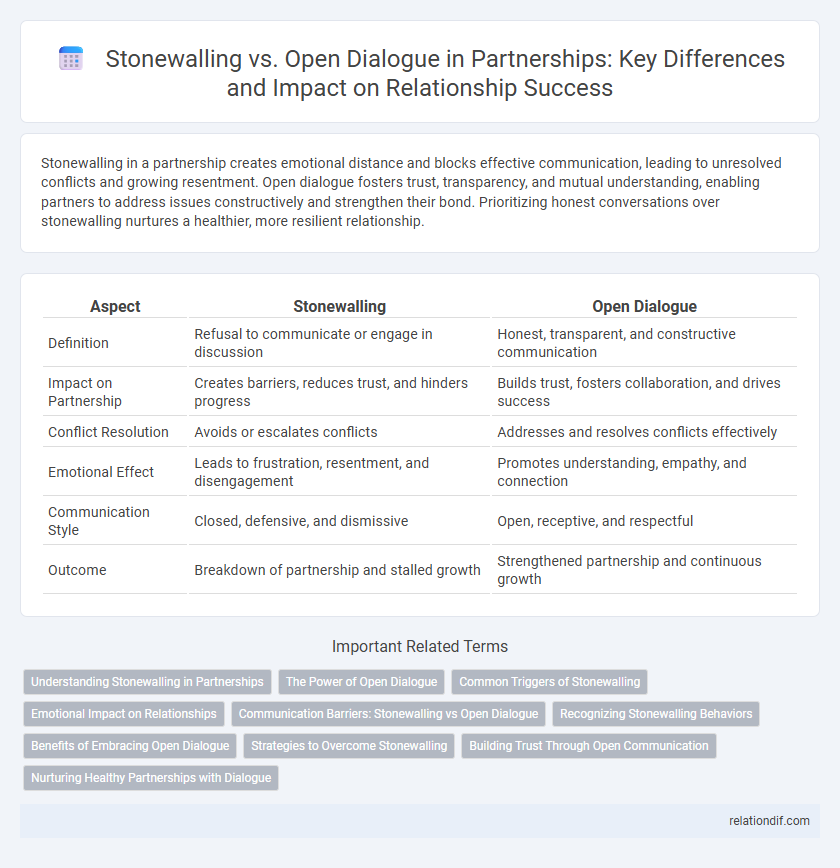Stonewalling in a partnership creates emotional distance and blocks effective communication, leading to unresolved conflicts and growing resentment. Open dialogue fosters trust, transparency, and mutual understanding, enabling partners to address issues constructively and strengthen their bond. Prioritizing honest conversations over stonewalling nurtures a healthier, more resilient relationship.
Table of Comparison
| Aspect | Stonewalling | Open Dialogue |
|---|---|---|
| Definition | Refusal to communicate or engage in discussion | Honest, transparent, and constructive communication |
| Impact on Partnership | Creates barriers, reduces trust, and hinders progress | Builds trust, fosters collaboration, and drives success |
| Conflict Resolution | Avoids or escalates conflicts | Addresses and resolves conflicts effectively |
| Emotional Effect | Leads to frustration, resentment, and disengagement | Promotes understanding, empathy, and connection |
| Communication Style | Closed, defensive, and dismissive | Open, receptive, and respectful |
| Outcome | Breakdown of partnership and stalled growth | Strengthened partnership and continuous growth |
Understanding Stonewalling in Partnerships
Stonewalling in partnerships occurs when one partner withdraws from communication, creating emotional distance and hindering conflict resolution. This behavior often manifests as silence, evasiveness, or refusal to engage, which can escalate misunderstandings and reduce trust. Recognizing stonewalling early enables couples to foster open dialogue, essential for maintaining emotional intimacy and collaborative problem-solving.
The Power of Open Dialogue
Open dialogue fosters trust and strengthens partnerships by encouraging transparency and mutual understanding. Addressing conflicts through honest communication prevents stonewalling, which can create barriers and erode collaboration. Embracing open dialogue empowers partners to resolve issues effectively and build lasting connections.
Common Triggers of Stonewalling
Common triggers of stonewalling in partnerships include feeling overwhelmed, perceiving criticism, and experiencing emotional flooding, which cause one partner to withdraw and shut down communication. High stress levels and unresolved conflicts often exacerbate these reactions, leading to silence instead of open dialogue. Recognizing these triggers allows couples to address them proactively, fostering healthier communication patterns and mutual understanding.
Emotional Impact on Relationships
Stonewalling in partnerships often leads to increased emotional distance, fostering feelings of frustration, loneliness, and resentment, which can severely damage trust and intimacy. Open dialogue encourages emotional vulnerability and mutual understanding, promoting empathy and resolving conflicts more effectively. Consistent communication strengthens emotional bonds and creates a supportive environment crucial for long-term relational health.
Communication Barriers: Stonewalling vs Open Dialogue
Stonewalling creates significant communication barriers by shutting down conversations and preventing emotional connection, which hinders conflict resolution and trust-building in partnerships. In contrast, open dialogue fosters transparency and mutual understanding by encouraging honest expression and active listening, essential for overcoming challenges together. Effective communication through open dialogue strengthens relationship resilience and promotes collaborative problem-solving.
Recognizing Stonewalling Behaviors
Stonewalling behaviors in partnerships often manifest as silent treatment, refusal to engage in conversations, or dismissive body language, signaling emotional withdrawal. Recognizing these signs early is crucial for addressing communication breakdowns and fostering a healthy, open dialogue. Awareness of stonewalling enables couples to implement strategies that encourage transparency and emotional connection.
Benefits of Embracing Open Dialogue
Embracing open dialogue in partnerships fosters transparency, builds trust, and accelerates conflict resolution by encouraging honest communication. This approach enhances collaboration effectiveness, as partners feel valued and understood, leading to innovative solutions and stronger relational bonds. Open dialogue reduces misunderstandings and emotional barriers commonly associated with stonewalling, ultimately promoting a healthier and more productive partnership environment.
Strategies to Overcome Stonewalling
Effective strategies to overcome stonewalling in partnerships include fostering open dialogue through active listening and expressing emotions transparently. Establishing regular check-ins and using "I" statements can reduce defensiveness while creating a safe environment for vulnerability. Incorporating third-party mediation or therapy often helps partners navigate persistent communication barriers and build trust.
Building Trust Through Open Communication
Building trust in partnerships hinges on open communication rather than stonewalling, which creates barriers and fosters misunderstandings. Transparent dialogue encourages vulnerability and empathy, enabling partners to navigate conflicts and align on shared goals effectively. Consistent openness cultivates a foundation of reliability and mutual respect essential for long-term collaboration.
Nurturing Healthy Partnerships with Dialogue
Stonewalling in partnerships often leads to unresolved conflicts and emotional distance, undermining trust and collaboration. Embracing open dialogue fosters transparency, mutual understanding, and effective problem-solving, which are essential for nurturing healthy partnerships. Consistent communication encourages emotional safety and strengthens the foundation of long-lasting, resilient relationships.
stonewalling vs open dialogue Infographic

 relationdif.com
relationdif.com